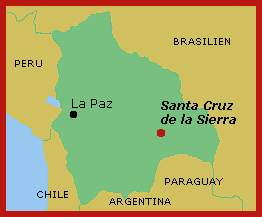Bolivia's wealthiest region claims for autonomy
The situation in Santa Cruz de la Sierra almost led to the resignation of President Mesa

A separatist movement led by rightist forces in the eastern region of Santa Cruz de la Sierra almost led to the resignation of Bolivia' s President Carlos Mesa last week as still threats with national dissolution. The situation gathered steam last week when a decision taken by the central administration moving up oil prices sparked a series of protests in Santa Cruz – an oil and gas rich area - that led to thousands of demonstrators to the streets demanding autonomy for the region. 
The crowd, which carried banners and chanted anti-government slogans, was addressed by civic leader Ruben Costas. He led the calls for an autonomous government in the wealthy Santa Cruz province. Santa Cruz de la Sierra is country's second largest city and the source of half of country's exports. Also a well known narcotics paradise, this landlocked region is located in the borders with Brazil and Paraguay.
The central government, in La Paz ordered the army to stay alert, as main public buildings were taken by rebels, as well as police and military premises. As for the slogans and public speeches of rebel leaders, their main intention is to obtain a self rule for Santa Cruz, but not the total independence of the province.
The demand for self-rule follows a series of demonstrations, strikes and blockades in Bolivia against a government decision earlier this month to raise fuel prices by as much as 23 percent.
The uprising was harshly crushed by President Carlos Mesa, who even threatened with his resignation if it succeeded with its demands. It has been also angrily criticized by leftist opposition leader, Evo Morales, as well as other members of the national parliament.
According to last reports from La Paz, country's capital, a group of lawmakers, priests and social leaders, will travel to Santa Cruz for talks to calm the situation. It has not been ruled out that talks could end with a call to a referendum to decide over the future status of the region.
Government officials accused Santa Cruz’s “oligarchy” of being behind separatist demands. They say an autonomous status of Santa Cruz would benefit them to deal with other countries and pay less taxes to the central administration. Analysts do not rule out the hand of dark forces (i.e. smugglers and drug traffickers), who would also benefit from an eventual self rule.
In October, 2003, violent anti-government protests left dozens dead and prompted then Bolivian President Gonzalo Sanchez de Lozada to resign.
Subscribe to Pravda.Ru Telegram channel, Facebook, RSS!


